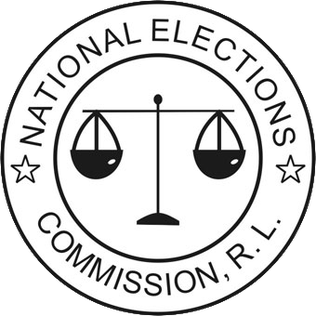
Politics of Liberia takes place in a framework of a presidential representative democratic republic modeled on the government of the United States, whereby the President is the head of state and head of government; unlike the United States, however, Liberia is a unitary state as opposed to a federation and has a pluriform multi-party system rather than the two-party system that characterizes US politics. Executive power is exercised by the government. Legislative power is vested in both the government and the two chambers of the legislature.

George Tawlon Manneh Oppong Ousman Weah is a Liberian politician and former professional football player currently serving as the 25th President of Liberia, in office since 2018. Prior to his election to the presidency, Weah served as Senator from Montserrado County. During his football career, he played as a striker. His prolific 18-year professional playing career ended in 2003.

Elections in Liberia occur solely at the national level. The head of state, the President of Liberia, is elected to a six-year term in a two-round system, in which a run-off between the two candidates with the highest number of votes is held should no single candidate earn a majority of the vote in the first round. The Legislature has two elected chambers.

The 2005 Liberian general election was held on 11 October 2005, with a runoff election for the presidency held on 8 November of that year. The presidency, as well as all seats in the House of Representatives and Senate were up for election. The election marked the end of the political transition following Liberia's second civil war and had been stipulated in the Accra Comprehensive Peace Agreement of 2003. Ellen Johnson Sirleaf, former World Bank employee and Liberian finance minister, won the presidential contest and became the first democratically elected female African head of state in January 2006.

The Unity Party (UP) is a political party in Liberia that was started in 1984 by Edward B. Kesselly, also its first standard bearer. Officially founded at Buchanan in Grand Bassa County, the party was established on 27 July 1985. The Unity Party participated in the first elections after the 1980 coup, running against President Samuel Doe in October 1985. The party has remained active in Liberian politics since and was, until 2017, the ruling party.

Congress for Democratic Change is a Liberian political party formed by supporters of George Weah's 2005 presidential campaign.
Togba-Nah Tipoteh is an economist, educator and politician, having been a presidential candidate in three elections. For more than three decades, he has been actively involved with democratic activities in promotion of human rights, liberties, constitutional rule and growth with development in Liberia and throughout Africa. He is President of the Movement for Justice in Africa (MOJA); was founding Chairman of the Collaborating Political Parties (CPP), an alliance of Liberian political parties; was founder and Director-General of Susukuu Incorporated, Liberia's oldest non-governmental development organization, which was credited by the West Africa Peacekeeping Force (ECOMOG) as helping to disarm over 10,000 combatants and child soldiers in Liberia during the 1997 disarmament program through a school for gun program; and was former Chairman of the Interest Groups of Liberia, a consortium of 32 national organizations with a collective membership of well over one million persons. He has worked in international development in the United States, the Netherlands, Mozambique, Ghana, South Africa and other countries, as well as for the United Nations system: Food and Agriculture Organization (FAO), United Nations Conference on Trade and Development (UNCTAD), International Monetary Fund (IMF), African Economic Community (ECA) and the International Bank for Reconstruction and Development (IBRD), among others.
Joseph Korto is a Liberian politician and member of the Liberia Equal Rights Party (LERP). Joseph Korto was born in Barpa, Nimba County, Liberia. He was Minister of Education in Liberia from 2006-2010 and was replaced by E. Othello Gongar, former Minister of Education during the regime of late president Samuel Kanyon Doe. He is also the Executive Director of the Liberian Development Foundation.
A new civil war began in 1999 when a rebel group backed by the government of neighboring Guinea, the Liberians United for Reconciliation and Democracy (LURD), emerged in northern Liberia. By the spring of 2001, they were posing a major threat to the Taylor government. Liberia was now engaged in a complex three-way conflict with Sierra Leone and the Guinea Republic. By the beginning of 2002, both of these countries were supporting the latest addition to the lexicon of Liberian guerrilla outfits – Liberians United for Reconciliation and Democracy (LURD), while Taylor was supporting various opposition factions in both countries. By supporting Sierra Leonean rebels, Taylor also drew the enmity of the British and Americans.

The 2011 Liberian general election was held on 11 October 2011, with a presidential runoff election held on 8 November 2011. The presidency, as well as all seats in the House of Representatives and half of the seats in the Senate, were up for election. The election was overseen by the National Elections Commission (NEC).

A referendum to amend the Constitution of Liberia was held on 23 August 2011. Voters chose whether to ratify four amendments regarding judge tenure, elections scheduling, presidential candidate requirements and the electoral system. The National Elections Commission of Liberia (NEC) oversaw the referendum.

Senate elections were held in Liberia on 20 December 2014, with half the seats in the Senate up for election.
Events in the year 2017 in Liberia.
Events in the year 2018 in Liberia.

Gbehzohngar Milton Findley is a Liberian Cabinet-Level government official, former President Pro Tempore of the Liberian Senate and a business executive. Findley is the current Minister of Foreign Affairs of the Republic of Liberia in the administration of President George Weah. He is the owner of a coffee and cocoa bean farm and produce packing company in Liberia which exports to Europe. Findley received primary education in Liberia and advanced degrees at Lund University in Sweden and Franklin University in the United States.



















